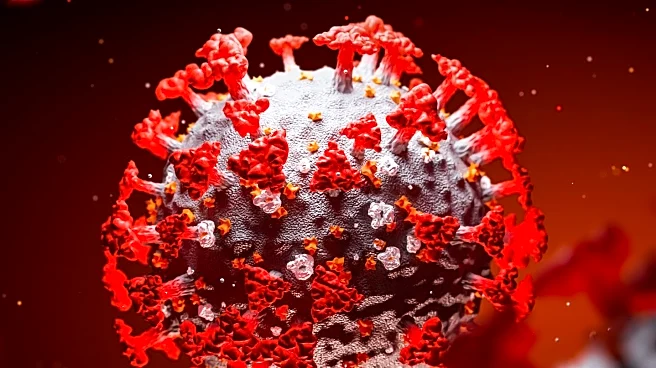What's Happening?
Recent research has identified the IFIT2–IFIT3 antiviral complex as a significant inhibitor of viral mRNA translation. The complex targets short 5’ untranslated regions on viral mRNAs, effectively inhibiting their translation. This discovery was made
through a series of experiments involving cell cultures and transient transfections, using various cell lines and viral stocks. The study involved the use of specific siRNAs to knock down IFIT proteins and assess their impact on viral infections. The research was conducted in compliance with ethical regulations and approved by relevant institutional committees. The findings suggest that the IFIT2–IFIT3 complex plays a crucial role in the cellular defense against viral infections, offering potential pathways for developing new antiviral therapies.
Why It's Important?
The identification of the IFIT2–IFIT3 complex as a key player in inhibiting viral mRNA translation could have significant implications for antiviral drug development. By understanding the mechanisms through which this complex operates, researchers can explore new therapeutic strategies to enhance the body's natural defenses against viral infections. This discovery may lead to the development of targeted treatments that can effectively combat viruses by disrupting their ability to replicate within host cells. The research contributes to the broader understanding of cellular antiviral responses, potentially informing public health strategies and improving outcomes for patients with viral infections.
What's Next?
Further research is needed to explore the full potential of the IFIT2–IFIT3 complex in antiviral therapy. Scientists may investigate the complex's interactions with other cellular components and its efficacy against a wider range of viruses. Clinical trials could be initiated to test the safety and effectiveness of therapies based on this complex. Additionally, researchers may focus on optimizing the delivery methods for these treatments, ensuring they reach the target cells efficiently. Collaboration between academic institutions, pharmaceutical companies, and government agencies will be crucial to advance this research and translate findings into practical applications.
Beyond the Headlines
The discovery of the IFIT2–IFIT3 complex's role in viral mRNA translation inhibition highlights the intricate nature of cellular defense mechanisms. It underscores the importance of basic scientific research in uncovering new pathways for disease treatment. The ethical considerations surrounding antiviral drug development, particularly in the context of genetic manipulation, will require careful attention. As research progresses, it will be essential to balance innovation with safety and ethical standards, ensuring that new therapies are both effective and responsible.

















